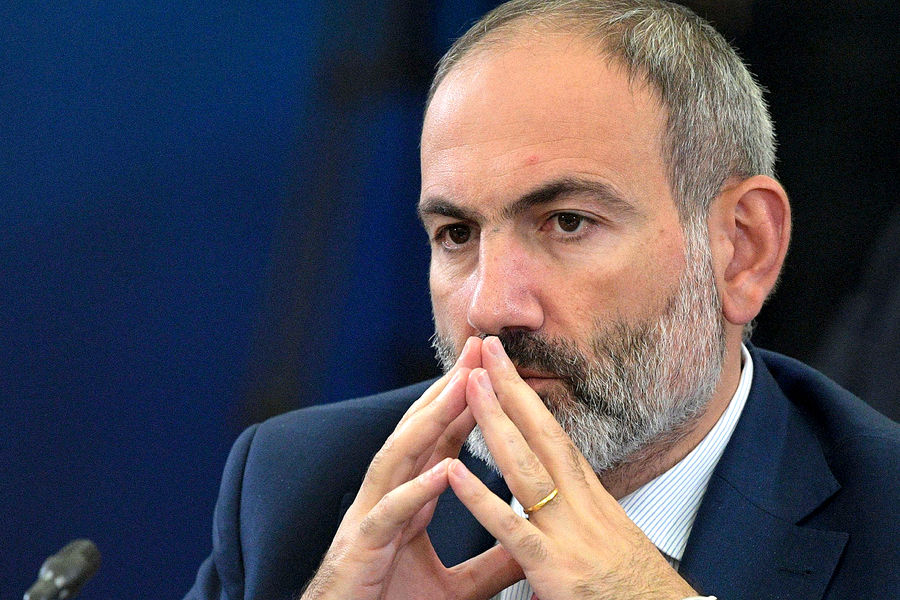
Day: September 25, 2023
An address by Prime Minister Nikol Pashinyan, who further accused Russia of faltering in its responsibilities toward Armenia, has angered Moscow, which on Monday said the Armenian leader, with his “unacceptable attacks,” was seeking to ruin Russian-Armenian relations and is looking to the West for support.
In a statement issued on Monday, the Russian foreign ministry rejected Pashinyan’s claims, who in a televised address, accused “outside forces” of attempting to sow dissent in Armenia.
“We are convinced that the Yerevan leadership is making a huge mistake by deliberately trying to destroy the multifaceted and centuries-old ties between Armenia and Russia and making the country a hostage to geopolitical games of the West,” the Russian Foreign Ministry said.
Pashinyan also seemed to blame Russia for Armenians’ exodus from Artsakh following last week’s large scale offensive by Azerbaijan, which left hundreds dead and injured and displaced thousands of Artsakh residents.
Pashinyan also stepped up his attacks, saying that membership in the Collective Security Treaty Organization and an alliance with Russia were not enough to ensure Armenia’s national security, adding that Armenia will normalize relations with Azerbaijan through frameworks put forth by the European Union.
The Russian Foreign Ministry hit back at Pashinyan, saying the prime minister was attempting “relieve himself of responsibility for failures in domestic and foreign policy by shifting the blame to Moscow.”
“Russia has always been faithful to its allied obligations, respected Armenian statehood and never confronted the republic with a choice: with us or against us,” it said in a statement. The statement blamed the Azerbaijani offensive on Pashinian’s controversial decision to recognize Azerbaijani sovereignty over Karabakh during October 2022 and May 2023 talks with Azerbaijani President Ilham Aliyev organized by the European Union. “This fundamentally changed … the position of the Russian peacekeeping contingent [in Karabakh,]” the Russian foreign ministry said.
These sentiments were echoed by Russia’s Interior Minister Vladimir Kolokoltsev, who visited Yerevan and met with Pashinyan, telling him that the West wanted to use the situation in Ukraine to squeeze Russia out of the South Caucasus region.
“The West wants to use the situation around Ukraine to squeeze Russia out of the South Caucasus, to destroy the Russian-Armenian bond. The United States and the EU obsessively offer their prescriptions for reforming key areas, including intelligence and law enforcement agencies, defense, and the judicial system. This state of affairs is undermining our alliance. Americans always pursue only their own interests, they don’t care about Armenia and Armenians,” Kolokoltsev said, according to the RIA Novosti news agency.
The Kremlin’s spokesperson Dmitry Peskov also took note of the remarks, categorically rejecting Pashinyan’s criticism of the Russian peacekeeping forces in Artsakh.
“The Russian peacekeepers have demonstrated real heroism in performing their duties according to their mandate,” Peskov said, adding that Moscow still regards Yerevan as an ally and will continue its “dialogue” with Pashinyan.
The day the shelling began, Genadi Hyusunts had just taken his four-day-old son home from the hospital.
Within hours, he had to hustle his wife, the newborn child and his six other children to the shelter in his native Martakert, which sits in Nagorno-Karabakh on the frontline of a three-decade conflict with Azerbaijan.
There, his breastfeeding wife and family faced days of hunger and sleeplessness in an overcrowded basement, as he headed for the frontline as part of a desperate defence of what Armenians see as their ancestral homeland.
“We didn’t have a place to sleep, we didn’t see a bed and in the very last days we didn’t have anything to eat,” said his sister, Gayane Shagants. “In the last days we were starving.”
Hyusunts, one of more than 6,000 refugees to have left Nagorno-Karabakh since Sunday, said that his son was healthy despite the ordeal. But his face darkens when asked about the short stint that he served before the Nagorno-Karabakh defence forces laid down their arms, effectively ending more than 30 years of self-rule by ethnic Armenians.
“I can not talk about that,” he said darkly.
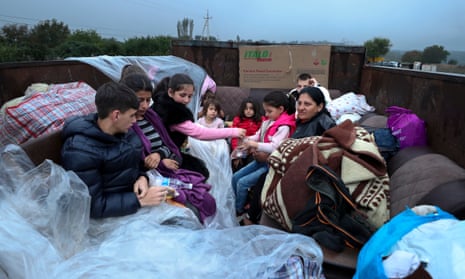
Just a week later, they are standing in the centre of Goris, a resort town near the border with Armenia that is now at the centre of an exodus of refugees that could swell up to 120,000 people. Every hour, hundreds more refugees are coming into the city in a convoy leaving Stepanakert, the Nagorno-Karabakh capital, that snakes for nearly 100km to the mountain serpentine that leads into Armenia.
After housing thousands of refugees, the border towns appear in danger of being overwhelmed, with city hotels and hostels fully booked and refugees crowding around municipal centres with all their possessions tied to the roofs of their cars.
Two disabled elderly people were hauled out of the back of an ambulance and carried on mattresses into a local administrative office to join hundreds of others registering as displaced people.
As a heavy rain began to fall on Monday, a young girl sobbed into her mother’s trouser leg in downtown Goris as they stood on the street holding a plastic-wrapped package on a street corner.
“I built my home for 30 years and the only thing that I have with me is this bag,” said Shagants. “My home is in this bag. They should be very happy that we are leaving because we left our homes to them.”
“My wealth is with me,” said Hyusunts, meaning his children. “I don’t care about the rest.”
It is just one of a tide of stories that emerge as thousands of refugees stream into Armenia in a historic exodus from the frontline with Azerbaijan.
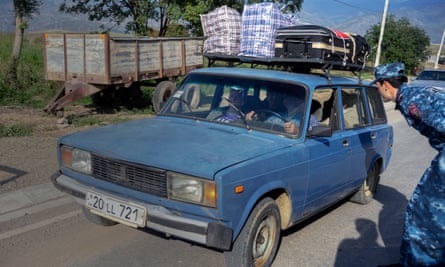
Many of those crossing through the Lachin corridor, which was blocked for 10 months by Azerbaijani forces, have already been forced from their homes before in past conflicts.
“I have already lived through my third war,” said Anna Hakobyan, a woman in her 70s, who evacuated with her 90-year-old mother. “I will never go back. It is enough for me.”
The two women sat in wheelchairs in the lobby of the Goris Hotel, whose rooms had already been fully booked out to accommodate for the hundreds of refugees from Nagorno-Karabakh arriving in the city. They held hands, Lucia sometimes massaging Anna’s palm to comfort her as she burst into tears as she recalled that she had left her son’s grave behind in Nagorno-Karabakh.
She said that after the bombs started hitting their village of Khanapat near the frontline, they also started hiding in the basement of her home. “We went back and forth, back and forth to the bunker, and you see my mother can barely walk.”
When the shelling reached the town, the municipal head ordered an evacuation to a local airport under the protection of Russian peacekeepers. But while they were safe there from shelling, they ended up stuck in a terminal with no food for days, while hundreds more were forced to sleep in a field with no shelter.

“We were sitting there for days without bread but at least we were in the terminal,” she said. “People were lying out there in the grass for days. Cutting up firewood for bonfires, looking for anything to eat.”
The tide of incoming refugees only appears to be increasing. On Sunday evening, the road was opened for refugees from Stepanakert, the local capital, setting off a potential influx into Armenia of tens of thousands more refugees from the city.
Much of the city was emptying out, Siranush Sargsyan, a freelance journalist who has been reporting on the blockade and war in Nagorno-Karabakh from Stepanakert. On a video call, she showed scenes of locals queueing to board minibuses and traffic jams of cars leaving the city. Those most likely to stay were elderly people, she said, who are being begged by their children and grandchildren to leave the city before Azerbaijan takes full control.
skip past newsletter promotion
Sign up to This is Europe
The most pressing stories and debates for Europeans – from identity to economics to the environment
Privacy Notice: Newsletters may contain info about charities, online ads, and content funded by outside parties. For more information see our Privacy Policy. We use Google reCaptcha to protect our website and the Google Privacy Policy and Terms of Service apply.
after newsletter promotion
The Guardian’s Andrew Roth speaks to journalist preparing to evacuate Nagorno-Karabakh – video
“We should leave,” said Sargsyan. “Because here for us with Azerbaijanis there is no life.”
Many have had to leave their families behind.
Yerazik, who asked to be identified by her nickname, fled Nagorno-Karabakh days after shells destroyed the school in her village just hours after the children had been sent from there to a shelter.
Her son refused to leave, she said. He works for the local emergencies ministry and said that he had to continue his work retrieving the hundreds of bodies from the fields and military positions around the territory.
“He was crying when we were leaving saying ‘how are you leaving the village and this land?’ I will became an Azerbaijani citizen but I will stay in my land,” she said.
Until he comes, she said, she cannot make any plans.
“We are lost,” she said. “We have no home, no relatives, nowhere to go.”

Narine Khachataryan and her five children also spent five days sleeping in a field outside the airport near Stepanakert, while her husband went to the front. She said that they slept on the ground under blankets given to them by locals, and ate military rations left over by the Russian peacekeepers.
“My husband participated in the defence of the village,” she said. “He didn’t call for three days, and when we called, the phone was unavailable. We all thought he was dead, the children were crying. On the fourth day, he called someone else’s phone, said everything is fine, I will come soon.”
When word came down on Sunday that they could evacuate to Armenia, her children were crestfallen.
“They felt terrible when they found out we could leave,” she said, describing the opening of the corridor into Armenia following a 10-month blockade that left Nagorno-Karabakh desperately short of food and fuel.
“I told them we would go to Armenia and that we will be back. I didn’t say we are leaving for good because they were crying.”
On Sunday, they finally boarded buses. But before leaving, they boarded the windows and sat the children on the floor in case the minibuses were hit by shelling.
Now in Armenia, she said, she was looking for somewhere to settle in peace, adding: “I would like to have a house of our own in the village, a garden to cultivate and to feed my children.”

Armenians take part in an anti-government protest in central Yerevan on September 24.
Thousands of ethnic Armenians continue to clog roads leading to Armenia from Nagorno-Karabakh, where new reports say a powerful explosion at a fuel depot has led to multiple deaths and injuries, with local health officials struggling to deal with the disaster.
Separatist officials in Karabakh said the blast occurred at a fuel warehouse near the Stepanakert-Askeran Highway and that rescue crews are at the site.
Details remain scarce and the cause is not yet known. Officials said most of the injured must be air-lifted to other sites where health facilities can handle the high number of casualties.
The reports come as Armenia struggles to deal with a flood of refugees fleeing Karabakh following Azerbaijan’s victory over separatist forces there.
Armenia’s government said that as of 5 p.m. local time on September 25, at least 6,650 refugees had entered the country, while de facto officials inside Nagorno-Karabakh said gas stations would provide free fuel for those making the move.
Unrest mounted on the streets of Yerevan, where dozens of demonstrators were detained after they blocked streets to protest the policies of Prime Minister Nikol Pashinian.
Meanwhile, top officials from the U.S. administration arrived in Yerevan on September 25 to meet with Armenian leaders. Among the group were U.S. Agency for International Development (USAID) chief Samantha Power and State Department official for the region Yuri Kim.
WATCH: Almost 5,000 people from Nagorno-Karabakh had crossed into Armenia as of midday on September 25, according to the Armenian government as it rushed to accommodate the influx of refugees.
“The United States is deeply concerned about reports on the humanitarian conditions in Nagorno-Karabakh and calls for unimpeded access for international humanitarian organizations and commercial traffic,” USAID said in a statement.
The first of several hundred refugees from the region began arriving in Armenia on September 24, with Nagorno-Karabakh leaders saying nearly all of the estimated 120,000 ethnic Armenians are likely to leave as soon as possible, saying they did not want to live under Azerbaijani control even though Baku has vowed to protect the rights of civilians there.
WATCH: Opposition supporters protested at several locations in the Armenian capital, Yerevan, on September 25.
“The authorities [of Nagorno-Karabakh] will continue to stay in place and implement state administration until they fully ensure the process of transporting citizens who wish to go to Armenia,” a statement by the de facto government said.
“Due to traffic jams, it is currently not possible to organize the transport of seriously and extremely seriously injured people.”
As Armenia began accepting refugees, anger over the quick loss of the region last week continued to spill out in the streets of Yerevan.
Media reports quoted police as saying more than 200 protesters had been detained so far on September 25, with reports from RFE/RL correspondents in Yerevan saying the protests continue, with groups of people roaming the streets urging others to join them.
Photo Gallery:
The unrest comes as Turkish President Recep Tayyip Erdogan met his ally, Azerbaijani President Ilham Aliyev, in Azerbaijan’s autonomous Naxcivan exclave — a strip of Azerbaijani territory nestled among Armenia, Iran, and Turkey — to discuss the situation in Nagorno-Karabakh.
Erdogan insisted Baku’s victory in last week’s offensive in Nagorno-Karabakh opened a window of opportunity for normalization of relations in the wider region. He called Azerbaijan’s actions “a source of pride” for Tukey.
Aliyev again vowed to protect the rights of Karabakh’s Armenians, even as the flood of refugees toward Armenia mounted.
Erdogan and Aliyev again discussed the idea of creating a land corridor through Armenian territory to Naxcivan, thus linking their two countries — a plan Armenia has long rejected. The project, if put in place, would likely intensify political pressure on Pashinian from his opposition. Pashinian has been on rocky political footing since overwhelming Azerbaijani forces retook much of the territory in and around Nagorno-Karabakh held for decades by ethnic Armenians in a six-week war in late 2020 that led to a Russian-brokered cease-fire.
Discontent over his leadership grew after the breakaway leadership in Nagorno-Karabakh was thrashed last week by a lightning Azerbaijani offensive that led Baku to declare victory in returning its sovereignty to the territory.
Pashinian and many Armenians blame Russia — which has traditionally served as Armenia’s protector in the region — for failing to use its peacekeeping force to protect ethnic Armenians in Karabakh.
Armenia is a member of the Collective Security Treaty Organization (CSTO) that Russia has tried to position as a counterweight to NATO, although as recently as this month its armed forces were conducting exercises with U.S. forces.
State Department spokesman Matthew Miller told reporters in Washington on September 25 that Moscow had shown “that it cannot be relied on as a security partner” following its failure to support Armenians in Karabakh.
The Russian peacekeepers have been in place since a cease-fire that ended six weeks of fighting in 2020 in which Azerbaijan recaptured much of the territory and seven surrounding districts controlled since the 1990s by ethnic Armenians with Yerevan’s support.
With reporting by AFP
By By Kathryn Armstrong & Nataliya Zotova for BBC
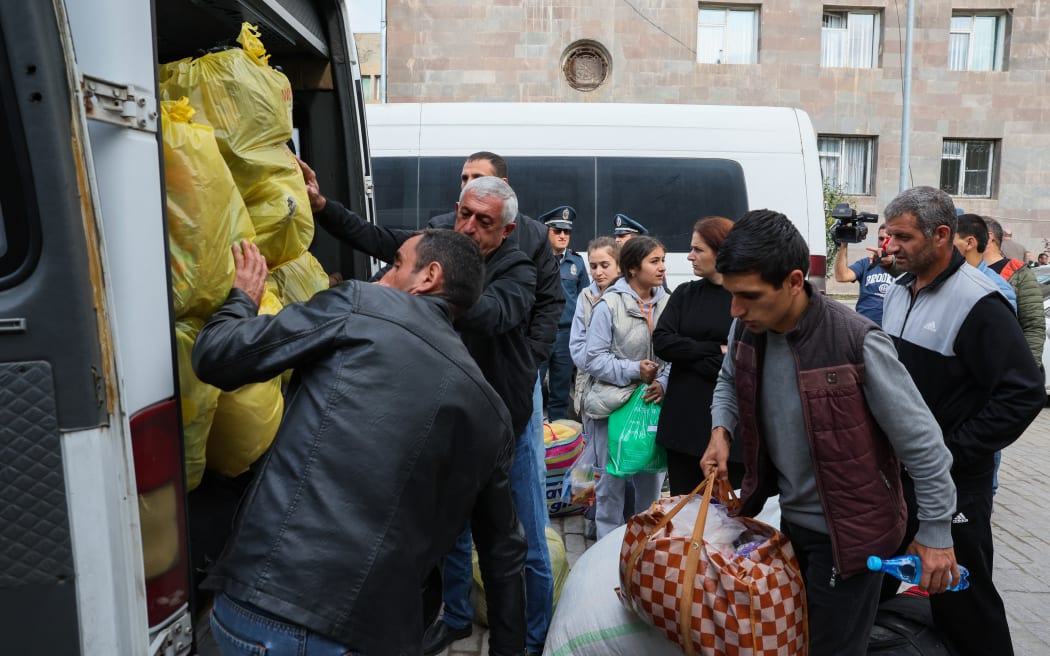
Refugees load their cars as they leave the Red Cross registration center, in Goris, on September 25, 2023.
Photo: AFP / Alain Jocard
More than 6,500 people have so far crossed into Armenia from the enclave, which is home to a majority of some 120,000 ethnic Armenians.
They left after the government in Yerevan announced plans to move those made homeless by the fighting.
It also warned that those who stayed could face ethnic cleansing.
Azerbaijan has said it wants to re-integrate the ethnic Armenians as “equal citizens”.
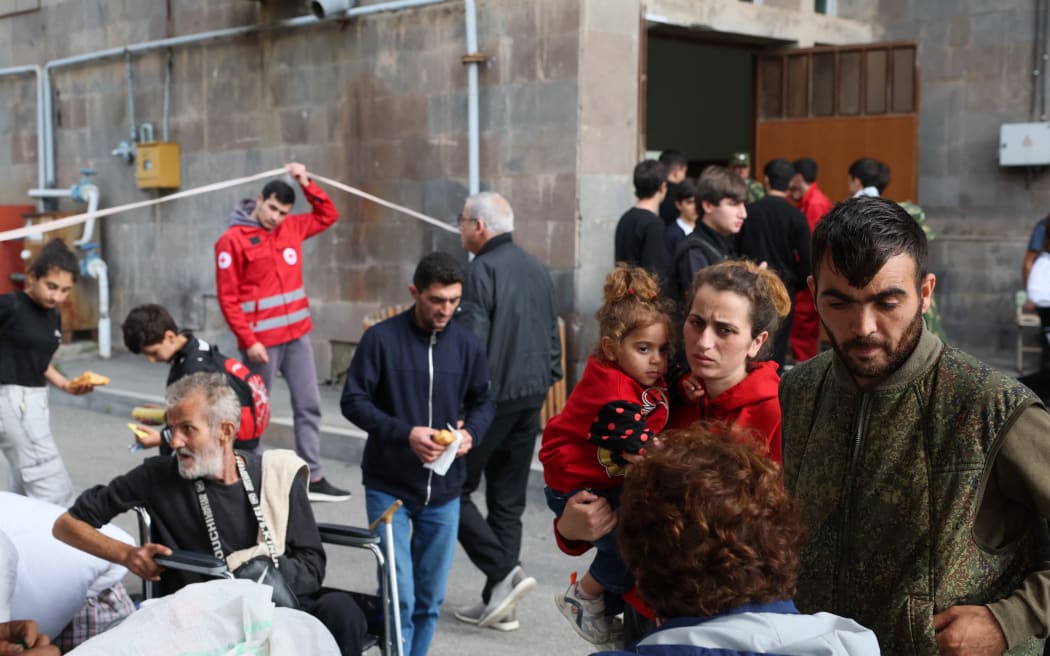
The first group of Nagorno-Karabakh refugees since Azerbaijan’s lighting assault against the separatist region entered Armenia .
Photo: AFP / Alain Jocard
The BBC has spoken to some of the refugees who arrived in the city of Goris on Sunday, close to the border between Armenia and Karabakh.
“I gave my whole life to my homeland,” said one man.
“It would be better if they killed me than this.”
A woman, Veronica, told the BBC that this was the second time she had become a refugee. The first time was during the conflict in 2020.
The main square of Goris was crowded. The theatre nearby was turned into a base for the Red Cross.
Tatiana Oganesyan, doctor and head of a foundation of doctors and volunteers that is now helping refugees in Goris, told the BBC that people who come to the doctors are exhausted, malnourished and psychologically crushed.
“People are shocked, they are telling us: I need pills, they are blue,” she said. Doctors then need to figure out their medication and find it for them.
“We have nothing,” said an elderly woman who just arrived in Goris. She pointed at her jumper, saying it was all she could bring with her from home. Her son was on crutches near her.
In the nearby village of Kornidzor, refugees who were being processed said they did not believe they could be safe under Azerbaijani rule and did not expect ever to be able to return home.
The Armenian government said in a statement on Sunday that hundreds of the refugees had already been provided with government-funded housing.
But it has not released a clear plan of how it could cope with an influx of people. Prime Minister Nikol Pashinyan announced last week that plans were in place to look after up to 40,000 refugees.
Armenians the BBC has spoken to have said they are prepared to take refugees into their homes.
Meanwhile, more than 140 people have been arrested in Yerevan on Monday following the latest anti-government protests, according to local media quoting the country’s interior ministry.
The Tass news agency said special forces had begun detaining demonstrators who blocked roads in Yerevan.
Police were also stationed outside the main government building, which houses the prime minister’s offices and which demonstrators have been trying to break into.
Protests first broke out last week over the government’s handling of the crisis in Nagorno-Karabakh.
Pashinyan has been accused of granting too many concessions to Azerbaijan and there are calls for his resignation.
The Armenian separatist forces in the territory agreed to disarm on Wednesday, following a lightning-fast Azerbaijani military offensive.
Armenia has repeatedly said a mass exodus from the region would be the fault of the Azerbaijani authorities.
In a TV address on Sunday, Pashinyan said many inside the enclave would “see expulsion from the homeland as the only way out” unless Azerbaijan provided “real living conditions” and “effective mechanisms of protection against ethnic cleansing”.
He repeated that his government was prepared to “lovingly welcome our brothers and sisters”.
But David Babayan, an adviser to Nagorno-Karabakh’s ethnic Armenian leader Samvel Shahramanyan, told Reuters he expected almost everyone to leave.
His people “do not want to live as part of Azerbaijan – 99.9 percent prefer to leave our historic lands”, he said.
“The fate of our poor people will go down in history as a disgrace and a shame for the Armenian people and for the whole civilised world,” he told Reuters.
“Those responsible for our fate will one day have to answer before God for their sins.”
Nagorno-Karabakh – a mountainous region in the South Caucasus – is recognised internationally as part of Azerbaijan, but has been controlled by ethnic Armenians for three decades.
The enclave has been supported by Armenia – but also by their ally, Russia, which has had hundreds of soldiers there for years.
Five Russian peacekeepers were killed – alongside at least 200 ethnic Armenians and dozens of Azerbaijani soldiers – as Azerbaijan’s army swept in last week.
On Sunday, Azerbaijan’s defence ministry said it had confiscated more military equipment including a large number of rockets, artillery shells, mines and ammunition.
Despite Azerbaijan’s public reassurances, there are fears about the residents of Nagorno-Karabakh, with only one aid delivery of 70 tonnes of food having been allowed through since separatists accepted a ceasefire and agreed to disarm.
Ethnic Armenian leaders say thousands are without food or shelter and sleeping in basements, school buildings or outside.
– This story was first published by BBC
Following the ceremony of signing documents, President of the Republic of Azerbaijan Ilham Aliyev and President of the Republic of Türkiye Recep Tayyip Erdogan have made press statements.
First, the head of state made his statement.
Statement by President Ilham Aliyev
– My dear brother.
Distinguished guests.
Welcome to Nakhchivan. I am sincerely greeting you.
My dear brother, this is your second visit to Nakhchivan, and the documents signed during the visit will serve the development of Türkiye-Azerbaijan relations.
The construction of the Igdir-Nakhchivan gas pipeline is an important event in the history of our fraternal relations. It will give a new impetus to our relations and largely ensure the energy security of Nakhchivan.
Nakhchivan is the ancient land of Azerbaijan. Unfortunately, in 1920, Western Zangezur was severed from Azerbaijan by Soviet authorities, and thus, the geographical link between the rest of Azerbaijan and Nakhchivan was cut off. When Armenia began to pursue the policy of aggression against Azerbaijan, it had territorial claims against Nakhchivan. Fierce battles were going on here as well, and precisely at that time, under the leadership of Heydar Aliyev, the great son of Azerbaijan – at that time he was the head of Nakhchivan – Nakhchivan put the enemy back in its place and managed to protect its territory. However, since Nakhchivan’s energy supply came from the rest of Azerbaijan at that time, Armenia cut off all electricity and gas lines, and Nakhchivan was practically under siege. There was no electricity, no gas, winters are very cold, so Nakhchivan lived without gas for 15 years.
However, according to the agreement signed with the Islamic Republic of Iran in 2005, the supply of gas from Iran to Nakhchivan was ensured as an exchange deal. The construction of the Igdir-Nakhchivan gas pipeline will create conditions for supplying natural gas to Nakhchivan through a second line.
In a few days, or rather, in three days, the Third Türkiye-Azerbaijan Energy Forum will be held in Nakhchivan with the participation of Turkish and Azerbaijani officials and international organizations, and I am sure that the results of this forum will be successful. Although Nakhchivan does not have gas or oil, it has the sun, and we have major plans for the construction of solar power plants in Nakhchivan. If these plans come true, Nakhchivan can become a green energy zone. Because there is a great potential for the construction of both solar and wind power plants, as well as hydropower plants, it will be possible to export at least 1000 megawatts of green energy from Nakhchivan to Türkiye in the future.
Five days ago, Azerbaijan fully secured its sovereignty. Whereas three years ago, as a result of the second Karabakh war, we ended the occupation, and on April 23 of this year we fully restored our territorial integrity by establishing a border checkpoint on the Azerbaijan-Armenia border in the direction of Lachin, five days ago we fully restored our sovereignty. As a result of the anti-terror measures carried out within 24 hours, actually even less than that, the Armenian army illegally stationed in the territory of Azerbaijan surrendered, accepted our conditions, and thus Azerbaijan fully secured its state sovereignty.
Although five days have passed, humanitarian aid has already started coming in from Azerbaijan to its Karabakh region and its ethnic Armenian population. Fuel, oil, diesel, gasoline, food, medicines and other humanitarian aid are being provided, and this once again shows that people living in the Karabakh region are citizens of Azerbaijan regardless of their ethnicity. Their security and rights will be ensured by the state of Azerbaijan.
A few days ago, a meeting was held between the representatives of the ethnic Armenians of Karabakh and representatives of the state bodies of Azerbaijan in the city of Yevlakh. A second meeting is being held today, the results of which I have not yet been informed about. However, I am sure that the process of integration of the Armenian population of Karabakh into Azerbaijani society will be successful.
My dear brother, when this incident happened, you were in America, in New York, attending a session of the UN General Assembly, and there, from the highest lectern in the world, you made statements expressing the interests of the state of Azerbaijan. You made fair statements, you made statements based entirely on international law: Karabakh is the land of Azerbaijan. This is both true and at the same time fully consistent with international law. At the same time, it is yet another fraternal step shown by Türkiye. During the second Karabakh war, you and the entire Turkish people were with us. In the first hours of the war, your words “Azerbaijan is not alone, Türkiye is with Azerbaijan” were a serious signal and message for many. The people of Azerbaijan have never and will never forget that political and moral support.
Two years ago, in the city of Shusha, which was liberated after a long occupation, the Shusha Declaration, a declaration of alliance, raised our relations to a new level. Today, these relations are at their highest, and we are now experiencing a very active period of our relations in all directions. We laid the foundation of the Igdir-Nakhchivan gas pipeline today. At one time, we laid the foundation of the TANAP project together, we inaugurated the TANAP pipeline, and today we are starting work on the construction of a gas pipeline from Türkiye to Nakhchivan, which is a part of Azerbaijan. The signing of the Protocol of Intent on the construction of the Kars-Nakhchivan railway is also a historic event. I am sure that this project will be successfully implemented and serve Azerbaijan, Türkiye and other countries as a component of the Middle Corridor.
At the same time, we have exchanged ideas regarding the expansion of the potential of the Baku-Tbilisi-Kars railway, and I informed you that the capacity of this railway will be increased from 1 million tons to 5 million tons in the coming months. The construction of the railway connecting Azerbaijan with Nakhchivan and Türkiye is also progressing successfully. The work in the territory of Azerbaijan will most likely be completed by the end of next year. In other words, all these historic projects show again how interconnected and close our countries are. By supporting each other, we also channel regional issues in the right direction. So, it is our common interest that there should be peace and tranquility in the region, there should be no wars, and the territorial integrity of countries should be ensured. Your support for Azerbaijan during the second Karabakh war, before and after, is an important factor in achieving this goal.
We are living in truly historic moments, days and years for Azerbaijan. The second Karabakh war, our historic Victory, the restoration of our sovereignty as a result of a successful operation five days ago are historic events, and we are rightly proud of them.
Important steps have been taken in all directions, including those to increase our turnover. Our turnover last year was more than 6 billion dollars, but it has increased by 40 percent in seven months of this year, and I am sure it will increase even more. It is true that the target is measured in high numbers. Some time ago, we aimed for a turnover of 15 billion dollars. At that time, the turnover was at about 2 billion dollars, but now it exceeds 6 billion dollars. We will probably reach it in the near future. A preferential trade agreement has also been signed, and the number of products on that list is also increasing. Therefore, I am sure that we will successfully achieve this.
My dear brother and distinguished guests, I sincerely welcome you to Nakhchivan again. I would like to once again express the immense love and affection of the Azerbaijani people for you. I wish you and the brotherly people of Türkiye continued successes and new victories. Thank you.
x x x
Then the President of Türkiye made a statement.
Statement by President Recep Tayyip Erdogan
– Dear Mr. President, my dear Brother.
Ladies, gentlemen.
Dear representatives of the media!
I greet you with the most sincere feelings on behalf of myself and my delegation.
After the presidential elections, I made my first trip to Baku and the Turkish Republic of Northern Cyprus in June. This time, I am very pleased to be together with you in Nakhchivan, which connects Türkiye with the Turkic world. I am proud to observe the progress achieved by Nakhchivan since my last visit in 2008. On the 100th anniversary of his birth, I pay tribute to Heydar Aliyev, the National Leader of Azerbaijan, who played a tremendous role in enabling Nakhchivan to reach its current level.
Turkish-Azerbaijani relations are at an exceptional level that is unparalleled in the world. Within the framework of the motto “One nation, two states”, we continue our activities to strengthen our relations and cooperation in all fields. The Shusha Declaration I signed together with my brother Ilham has been a turning point that raised our relations to the level of alliance. Nakhchivan has a special place in our relations with Azerbaijan due to its strategic importance throughout history. Today, Nakhchivan has great potential in terms of economy, transport and energy lines. Together with the creation of regional transport lines, we will have the opportunity to fully unlock this potential.
The importance of the International East-West Middle Corridor passing through the Caspian Sea has been better understood as a result of the coronavirus pandemic and the wars in our region. In this regard, the Igdir-Nakhchivan gas pipeline project, which we laid the foundation of a little while ago, will further deepen our partnership with Azerbaijan in the field of energy and also contribute to European energy security. In addition to the Kars-Nakhchivan railway project, contracts for residential buildings and electricity were signed a little earlier. Thus, we have once again expressed our determination to develop our relations in the fields of transport, logistics and energy.
On behalf of myself and my nation, I would like to thank our Azerbaijani brothers for their strong support in healing the wounds of the February 6 earthquakes. We will never forget the sincerity of our brothers who loaded their belongings on their cars and set off to help our nation.
After our press statements, we will inaugurate the military restoration and production complex, which we have modernized. This project will also make significant contributions to our cooperation in the field of defense industry.
Dear representatives of the media, critical processes took place in our region in recent days. Unfortunately, Azerbaijan could not find the necessary response to its legitimate and justified concerns, which it had been repeatedly expressing in the last three years after the second Karabakh war. As a result, it was forced to implement anti-terror measures in its sovereign territories. It was a source of pride for us that these measures were successfully completed in an extremely short time, with great care for the rights of civilians. I pray for Allah’s mercy on our brothers who were martyred during the events and extend my condolences to their relatives. I wish speedy recovery to our wounded.
We were lucky enough to see this prayer by the late Huseyn Javid, a prominent poet of Nakhchivan and a close friend of Mehmet Akif, being accepted a century ago:
Our country was spared from all troubles,
Long live our glorious army…
I heartily congratulate the victorious Azerbaijan Army on the occasion of both its historic victory and its humane treatment of civilians. Our Azerbaijani brothers have once again shown the justice and mercy characteristic of Turks to the whole world.
Following the recent victory, new windows of opportunity have been opened for comprehensive normalization of the situation in the region. I believe this opportunity must be appreciated. We expect Armenia to accept the hand of peace extended to it and be sincere. As I always emphasize, there are no losers in peace. The creation of peace, stability and prosperity in our region is our duty to our people. We are determined to fulfill this duty and we are sincere. We want the other side to show the same sincerity.
With these thoughts, I once again express my satisfaction to be visiting Azerbaijan. I once again thank the President and my dear brother Ilham Aliyev and all our Azerbaijani brothers for the hospitality shown to me and my delegation. May Allah make our love and brotherhood permanent. Thank you.
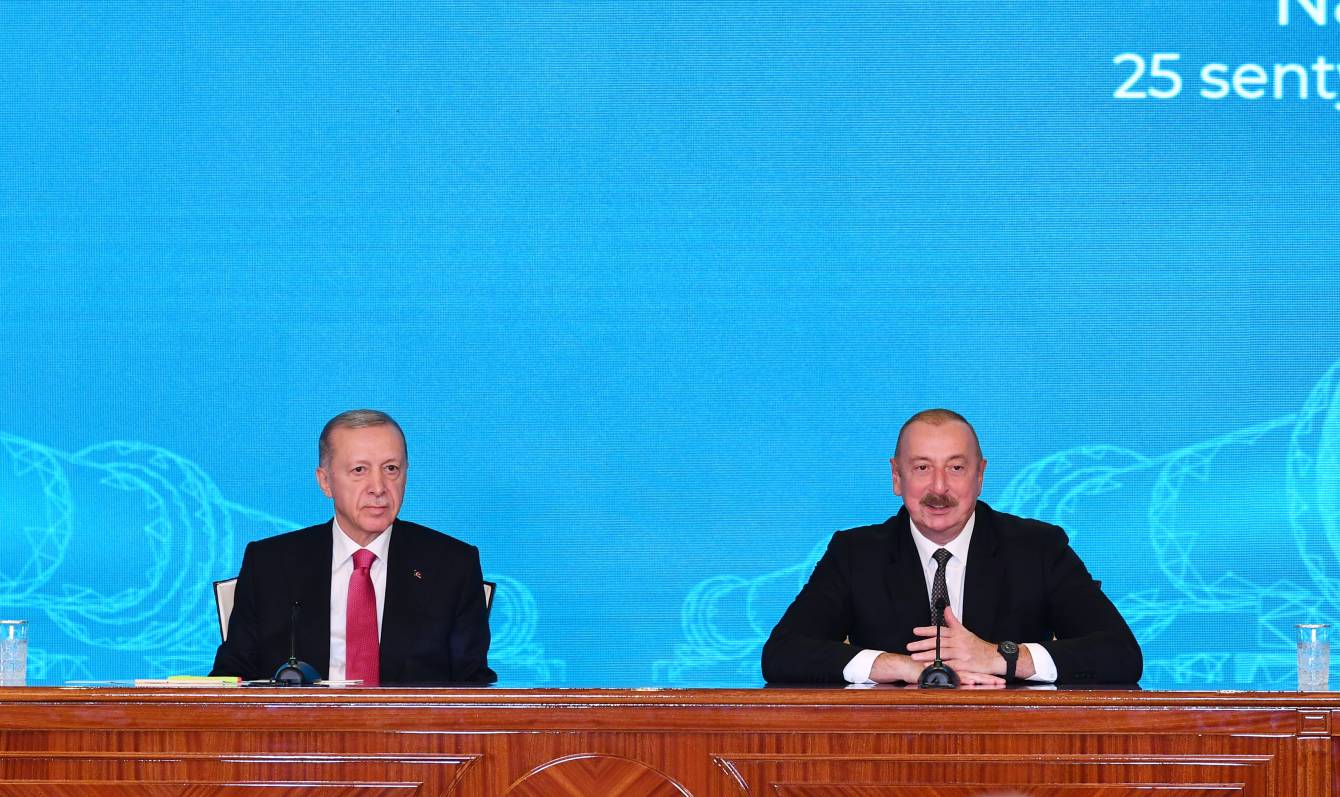
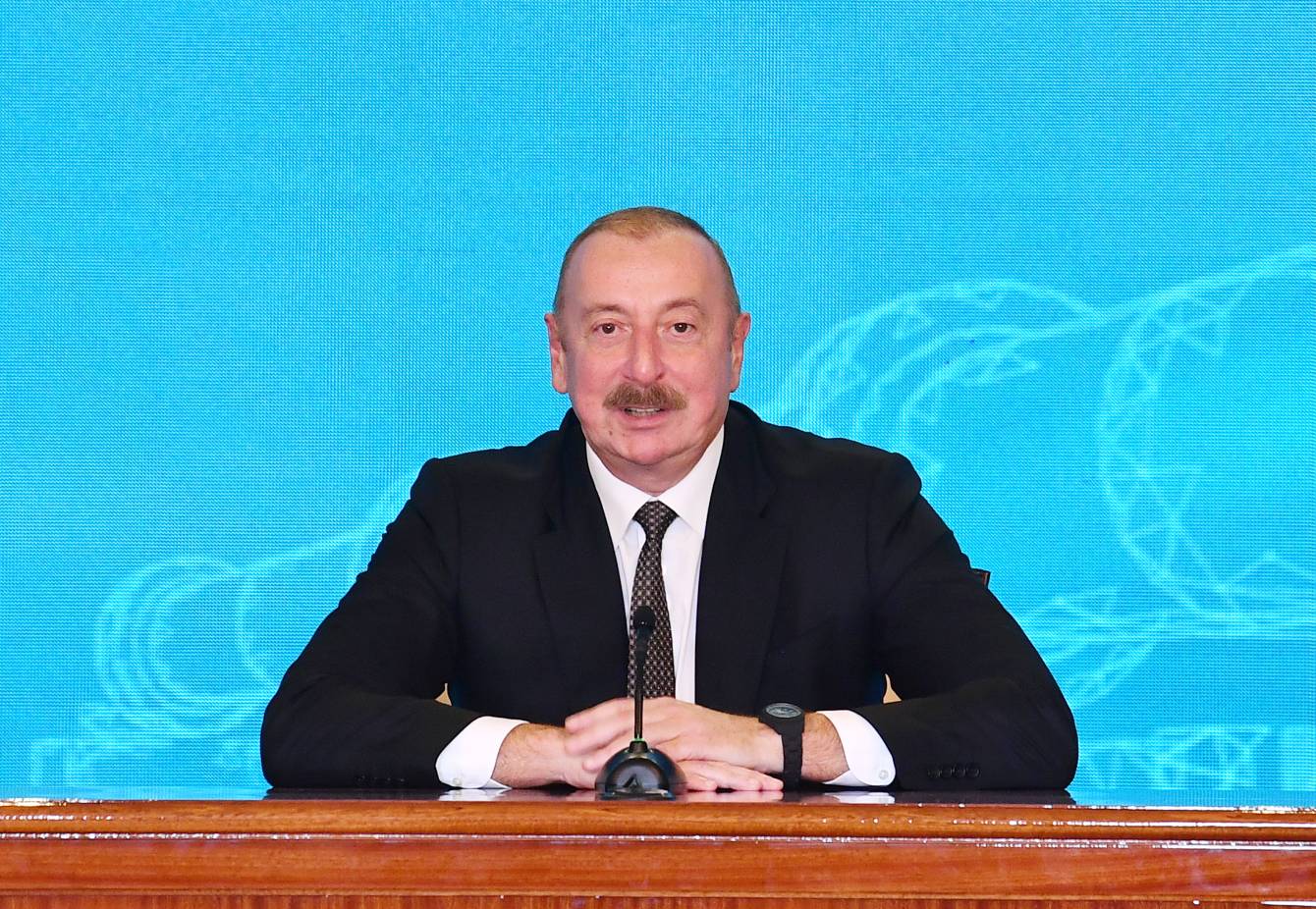
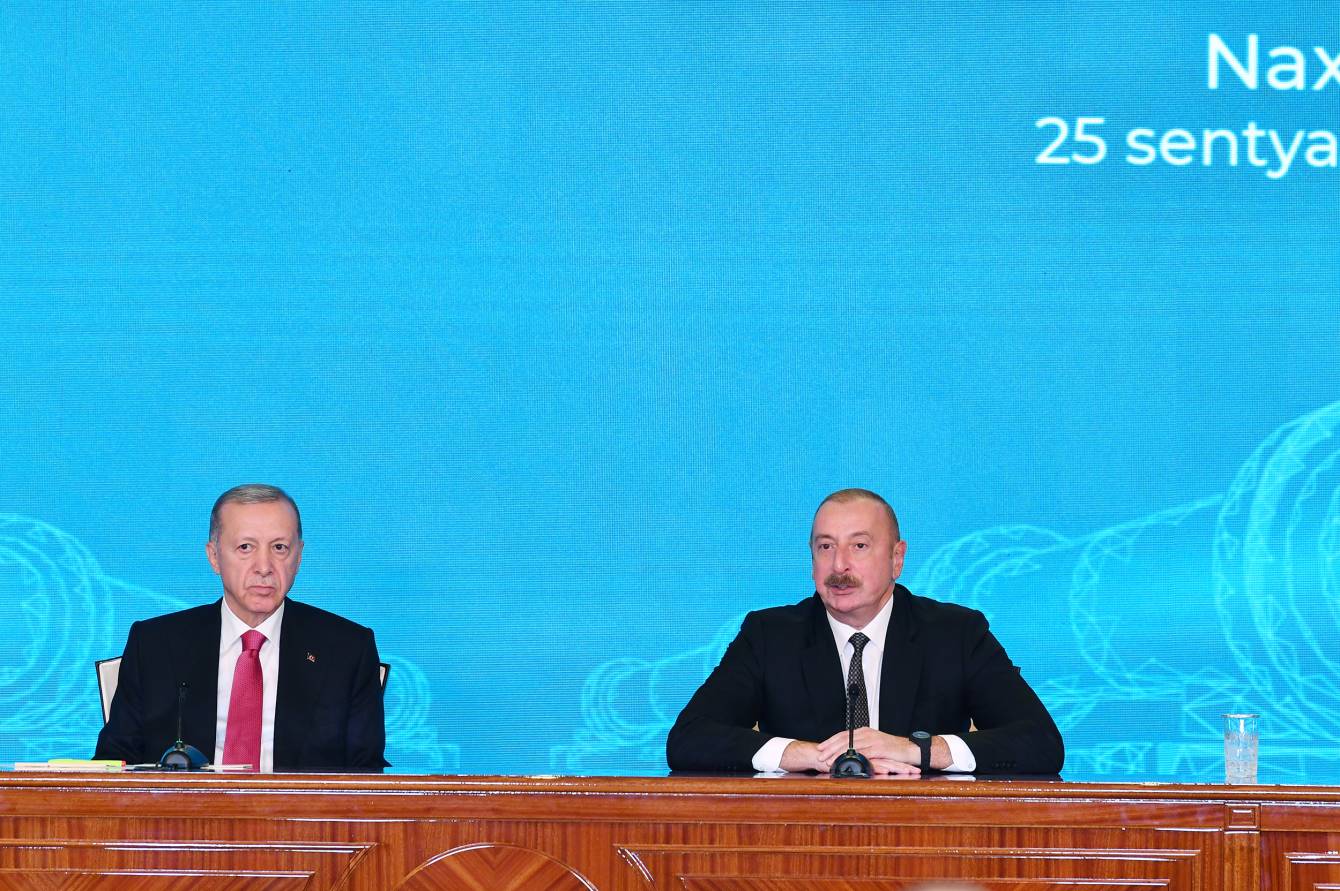
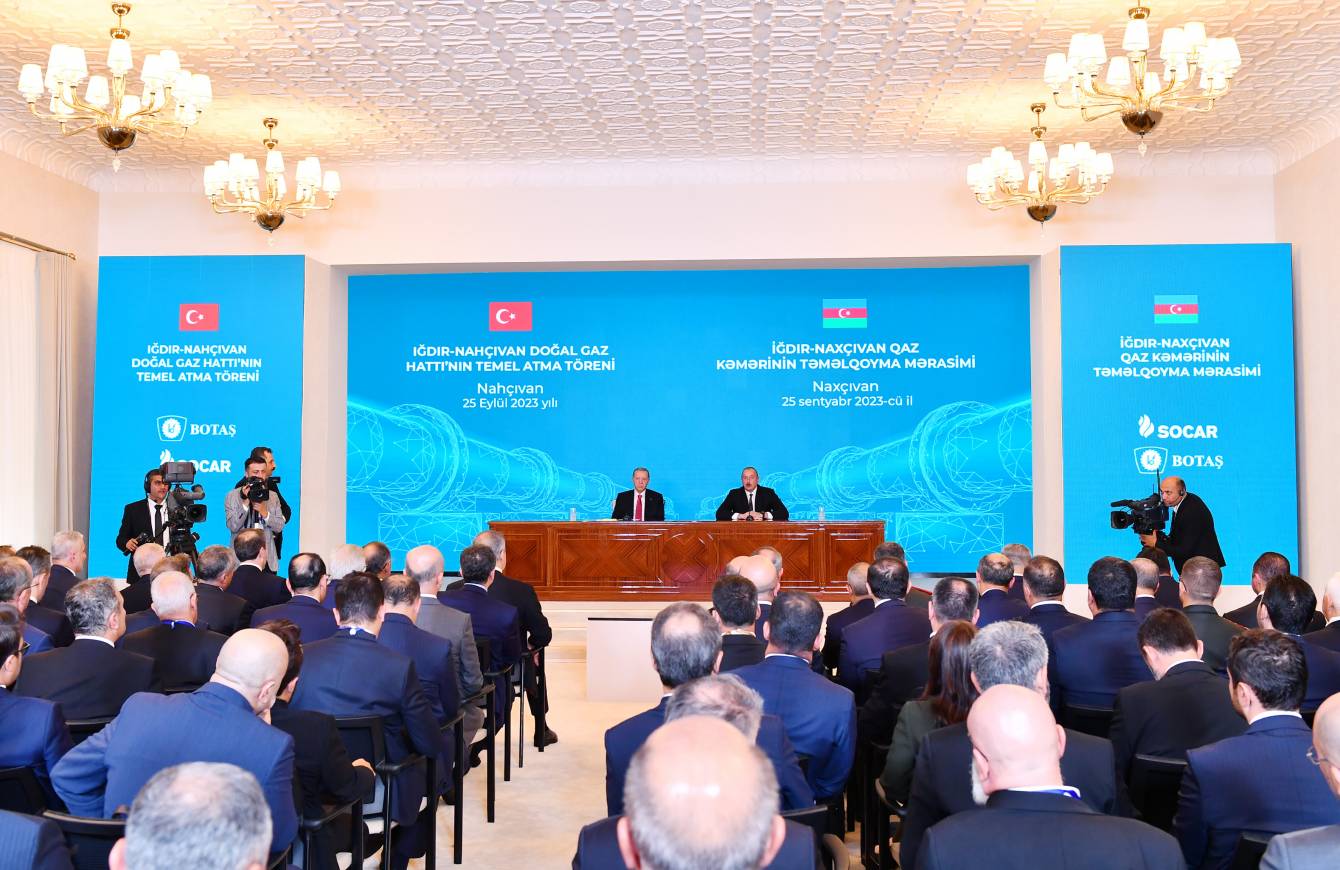
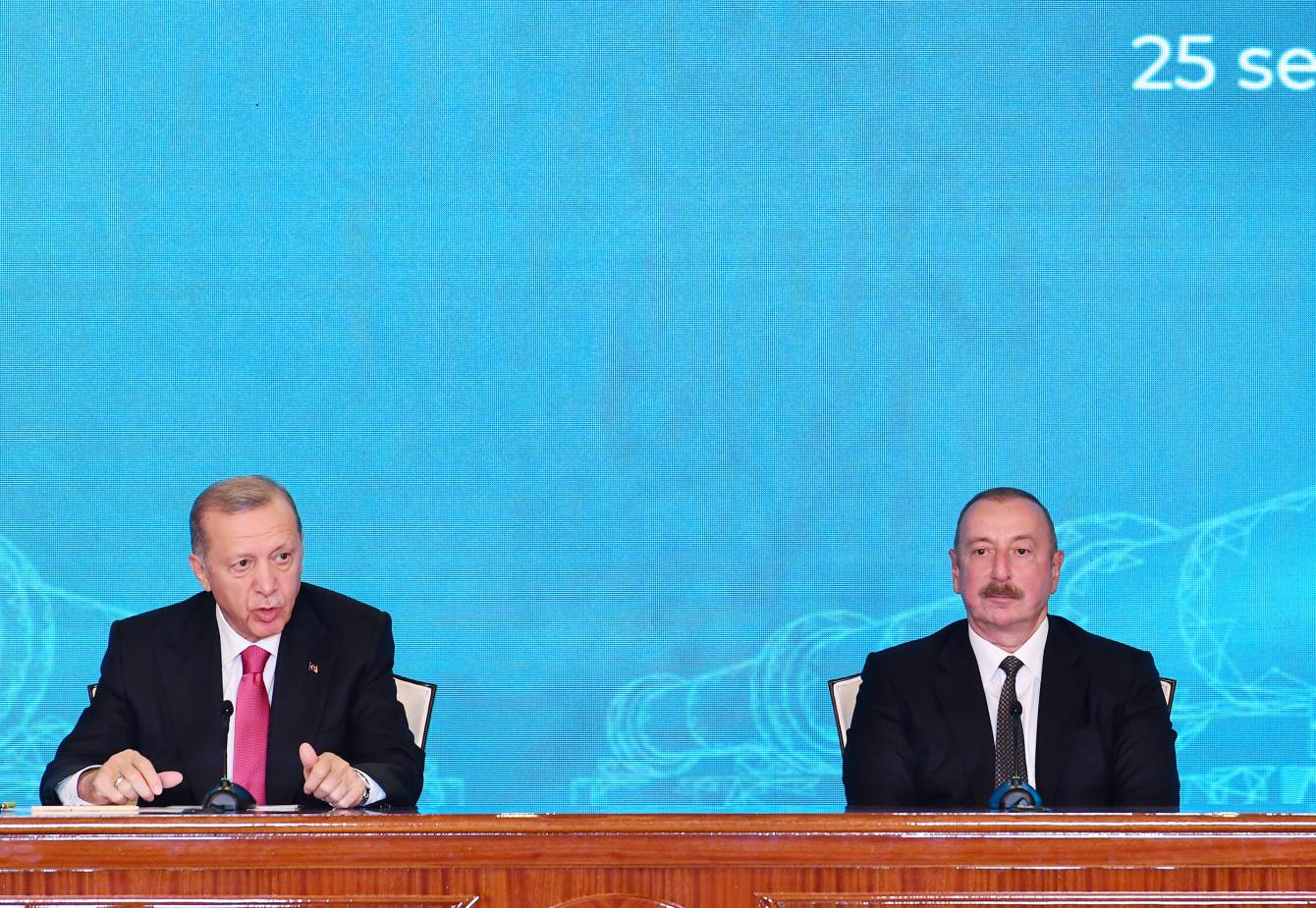
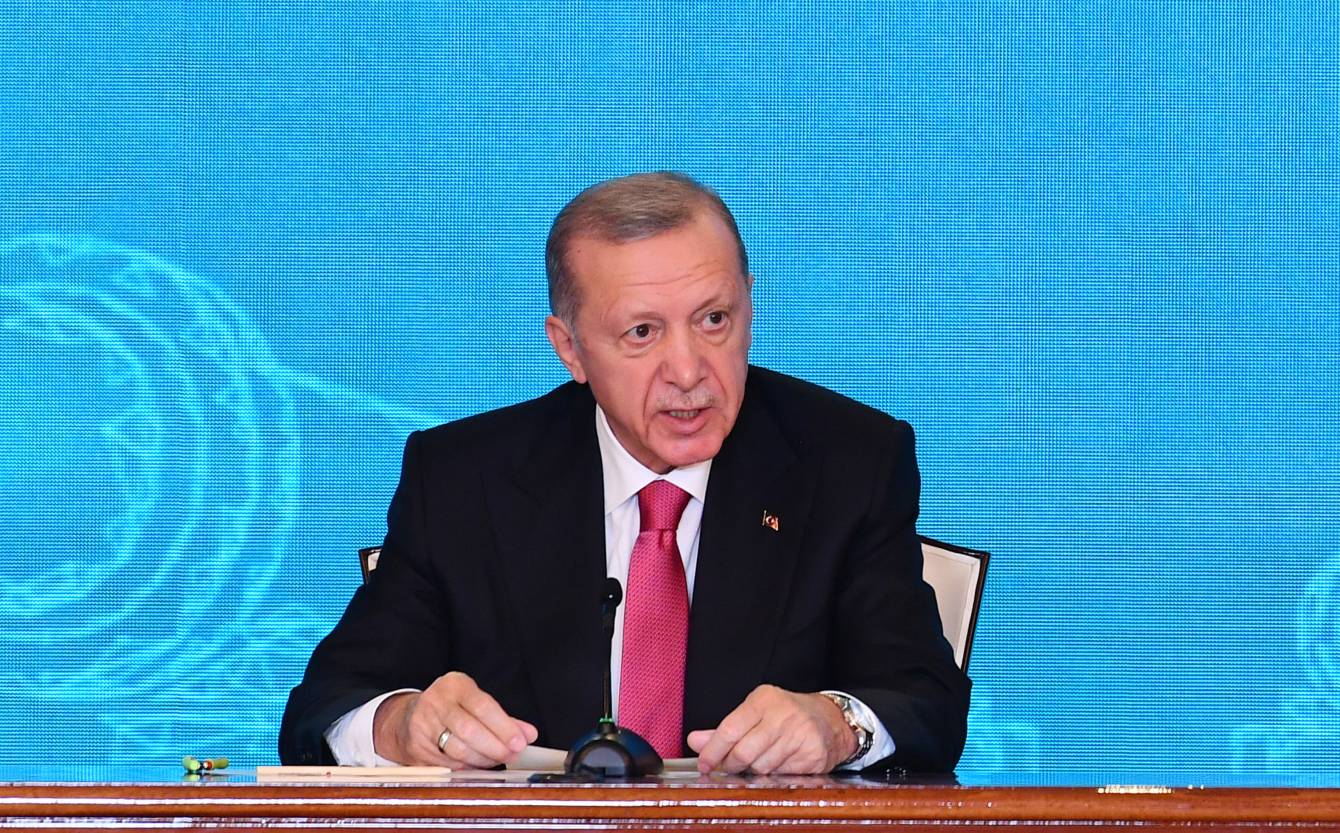
Official Yerevan on Thursday hit back at Moscow’s assertion that the actions of the Armenian government, and Prime Minister Nikol Pashinyan, are to be blamed for Azerbaijan’s blockade of the Lachin Corridor and the resulting humanitarian crisis in Artsakh.
Russian foreign ministry spokesperson Maria Zakharova told a press briefing on Thursday that Pashinyan’s recognition of Azerbaijan’s territorial integrity that supposes Baku’s sovereignty over Artsakh has resulted in the current situation in Artsakh.
“I would like to remind that the current situation in the Lachin corridor is a consequence of Armenia’s recognition of Nagorno-Karabakh as part of the territory of Azerbaijan,” Zakharova said. “This was formalized as a result of summits attended by the leaders of the two countries under the aegis of the European Union in October 2022 and May 2023.”
“We believe that placing the blame in this context on the Russian peacekeeping contingent is inappropriate, wrong and unjustified,” Zakharova told a news briefing.
Armenia’s foreign ministry spokesperson Ani Badalyan on Thursday said that Moscow’s statement has caused “confusion and disappointment” for Yerevan, asserting that Russia itself has, on numerous occasions, recognized Artsakh as part of Azerbaijan.
Below is Badalyan’s complete statement.
Remarks by the official representative of Russia’s Ministry of Foreign Affairs, who yet again, claimed that the situation unfolding in the Lachin corridor is a consequence of the fact that Armenia’s recognition of Nagorno-Karabakh as part of Azerbaijan in October 2022 during a meeting in Prague based on the Alma Ata declaration has altered the mission of the Russian peacekeepers to that of ensuring the rights and security of the Armenians in Nagorno-Karabakh has caused confusion and disappointment.
We are compelled to recall the following, already well-known chronology and important circumstances.
- The Nagorno-Karabakh conflict has never been a territorial dispute between Armenia and Azerbaijan. In essence, it has always been and remains an issue of the rights and security of the people of Nagorno-Karabakh.
- In August 2022, Armenia agreed to Russia’s draft proposal on the normalization of relations between Armenia and Azerbaijan, according to which the discussion of the status of Nagorno-Karabakh was supposed to be postponed for an indefinite period. Azerbaijan rejected the proposal, simultaneously announcing (as it did on August 31 in Brussels) that it is not going to discuss anything related to Nagorno-Karabakh with Armenia, and days later, on September 13, it launched military aggression against the sovereign territory of Armenia.
- Russia not only did not pursue its proposal after Azerbaijan’s refusal, but also showed absolute indifference to the aggression against the sovereign territory of the Republic of Armenia, leaving Armenia’s official letter to support the Republic of Armenia on the basis of the bilateral legal framework unanswered. Moreover, Russia conditioned the lack of stating the fact of the attack on Armenia and the resulting inaction under the false excuse that the interstate border between Armenia and Azerbaijan is not delimited. By this approach it either intentionally or not supports the obviously false and extremely dangerous thesis which claims that there is no border between Armenia and Azerbaijan, therefore, attacking the border and the invasion into the territory of Armenia are difficult to verify. With the same mindset, Armenia’s similar application in the framework of the CSTO did not receive a proper response either.
- Under these circumstances, on October 6, 2022, in Prague, Armenia and Azerbaijan reaffirmed their support of the Alma-Ata Declaration, which was signed back in 1991 by the former Soviet republics, including Armenia, Azerbaijan and Russia, who recognized each other’s territorial integrity along the former administrative borders of the Soviet states. Therefore, nothing new was decided in Prague: as of October 2022, the Alma-Ata Declaration had been in force for about 31 years. The agreements in Prague did not change anything in the context of the Trilateral statement of November 9, 2020, either. The only new development was that, based on the results of the Prague meeting, the EU decided to deploy a monitoring mission on the Armenian side of the interstate border between Armenia and Azerbaijan to contribute to the stability at the border.
- The Russian Federation has recognized Nagorno-Karabakh as part of Azerbaijan multiple times, including after the signing of the Trilateral statement of November 9, 2020, and the most recent and perhaps most significant instance was when it stated that it recognizes the territorial integrity of Azerbaijan in the document on establishing strategic relations with Azerbaijan.
- On December 12, 2022, the Lachin corridor was blocked, under the false pretext of protests organized by the authorities of Azerbaijan in the area of the control of the Russian peacekeeping contingent. Already in April 2023, in the presence of Russian peacekeepers, Azerbaijan installed an illegal checkpoint in the Lachin corridor. Although these actions were a clear and gross violation of the Trilateral statement, the Russian Federation took no counteractions. Instead, Russian peacekeepers on June 15, 2023, actively supported the attempt to raise the Azerbaijani flag on the sovereign territory of the Republic of Armenia, which is outside the scope of their mission and geographical area of responsibility. This was immediately followed by the total blockade of the Lachin corridor, bringing the situation in Nagorno-Karabakh closer to a true humanitarian catastrophe.
- In circumstances of such arbitrariness in the presence of Russian peacekeepers, the Azerbaijani side has resorted to steps such as the abduction of residents of Nagorno-Karabakh at the illegal checkpoint in the Lachin corridor: the case of abduction of Vagif Khachatryan on July 29, followed by the case of three students on August 28.
- Unfortunately, such practices of the Russian peacekeeping contingent in Nagorno-Karabakh are nothing new. On December 11, 2020, the violation of the contact line in Nagorno-Karabakh, the illegal occupation of Khtsaberd and Hin Tagher villages, the capture and transfer of 60 Armenian servicemen to Baku took place in Nagorno-Karabakh with the presence and permission of representatives of the Russian peacekeeping contingent. At that time, the agreements of October 6, 2022, were not reached. The same applies to the events of Parukh on March 24, 2022, and Saribab on August 1, 2022, when Azerbaijan again violated the contact line in Nagorno-Karabakh. The logical continuation of this are the shootings by Azerbaijani armed forces in the presence of Russian peacekeepers towards people carrying out agricultural works, one of which ended with the killing of a tractor driver from Martakert; the intimidation of the Nagorno-Karabakh population with night lights and loudspeakers again in the presence of Russian peacekeepers; the thousands of violations of the ceasefire regime by the Azerbaijani armed forces again in the presence of Russian peacekeepers.
We advise that the representative of the Russian Foreign Ministry refrain from maneuvering the circumstances of the situation and thereby further complicating it in the absence of actions from Russian peacekeepers toward the prevention of the blockade of the Lachin corridor or its opening afterward.
We also reiterate that the Republic of Armenia is faithful to its commitment towards establishing stability in the region on the basis of mutual recognition of territorial integrity and borders. At the same time, we consider imperative for lasting peace the reopening of the Lachin corridor in accordance with the Trilateral statement of November 9, 2020, and in line with the Orders of the International Court of Justice, the prevention of a humanitarian catastrophe in Nagorno-Karabakh and addressing of all existing problems through the Baku-Stepanakert dialogue under international auspices.

Armenian Prime Minister Nikol Pashinyan received Russian Interior Minister Vladimir Kolokoltsev Monday.
The Prime Minister’s Office informed that Nikol Pashinyan emphasized the close cooperation and consistent work between the Ministries of Internal Affairs of the two countries in the fight against crime and in other fields.
Kolokoltsev touched upon the results of discussions with Armenian partners and joint programs.
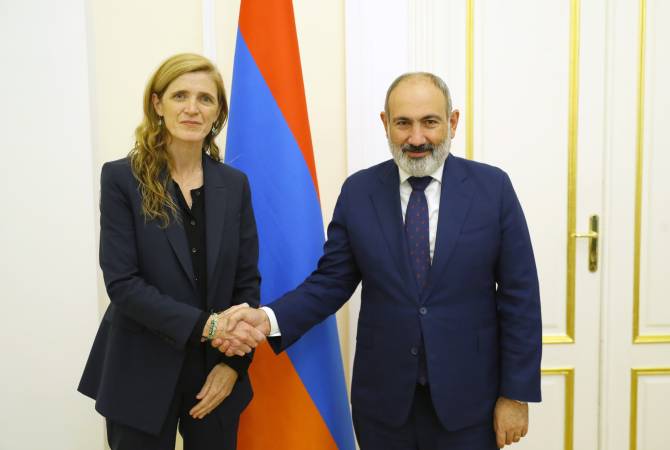
19:46, 25 September 2023
YEREVAN, SEPTEMBER 25, ARMENPRESS. Prime Minister Nikol Pashinyan met on Monday with the delegation led by USAID Administrator Samantha Power, which included U.S. State Department Acting Assistant Secretary for Europe and Eurasian Affairs Yuri Kim.
PM Pashinyan welcomed Power’s visit in this difficult period for Armenia, the Prime Minister’s Office said in a readout.
“I believe you are aware of the overall situation, because we’ve had the opportunity to discuss this situation with members of the US House of Representatives, and two days ago I had a phone call with Secretary of State Blinken. Our partners maintain contact and I think it’s very important that we have this opportunity to discuss all details of the current situation in our region. As you know, unfortunately at this moment the process of ethnic cleansing of Armenians in Nagorno-Karabakh continues, and this is a very tragic fact. We were trying to warn the international community that the ethnic cleansing would happen, but regrettably we were unable to prevent it. But this situation and the tension continues to grow in our region, and now it is very important to take concrete steps to prevent further escalation and even bigger problems. I am very glad for this opportunity and I welcome you in our country,” PM Nikol Pashinyan said.
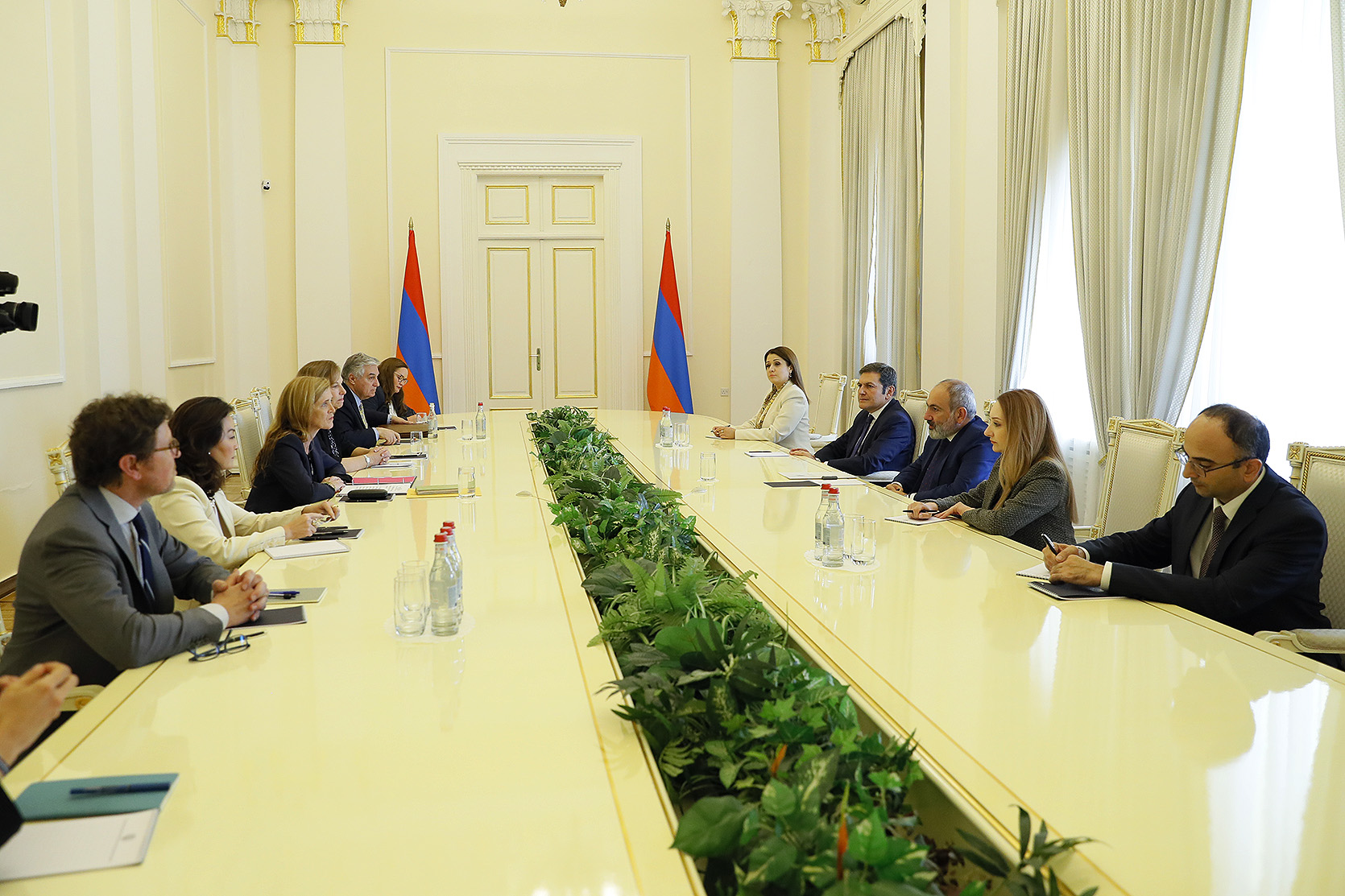
Samantha Power thanked the Prime Minister for the warm reception.
“I know how busy you are given the current situation. President Biden sent me and my delegation here to underscore the U.S.’s deep commitment to Armenia’s sovereignty, territorial integrity and democracy. I know that the USAID is working with the Armenian people, and the government of Armenia has never displayed irresolution in this matter, and this is very important. We have arrived in Armenia, and I hope to once again have a chance to come here to discuss our steps aimed at strengthening your deepening democracy, but during this visit, of course, we are focused on a concrete crisis, on the humanitarian needs of the people of Nagorno-Karabakh, the humanitarian needs of those who fled Nagorno-Karabakh. I believe approximately 5000 people crossed into Armenia today, and we are treating very seriously our responsibility to mobilize resources, ourselves, to support the local self-governing bodies in finding accommodation and other measures of assistance, but also to encourage other countries to do the same. The United States of America will continue to work with both your and the Azerbaijani government in the direction of achieving lasting peace between the countries, also taking into consideration the deep economic benefit and stability it would ensure for the Armenian people. The steps you have taken in separation of powers, fight against corruption, these are all investments in Armenia’s future,” Power said.
The USAID Administrator conveyed U.S. President Joe Biden’s letter addressed to PM Nikol Pashinyan.
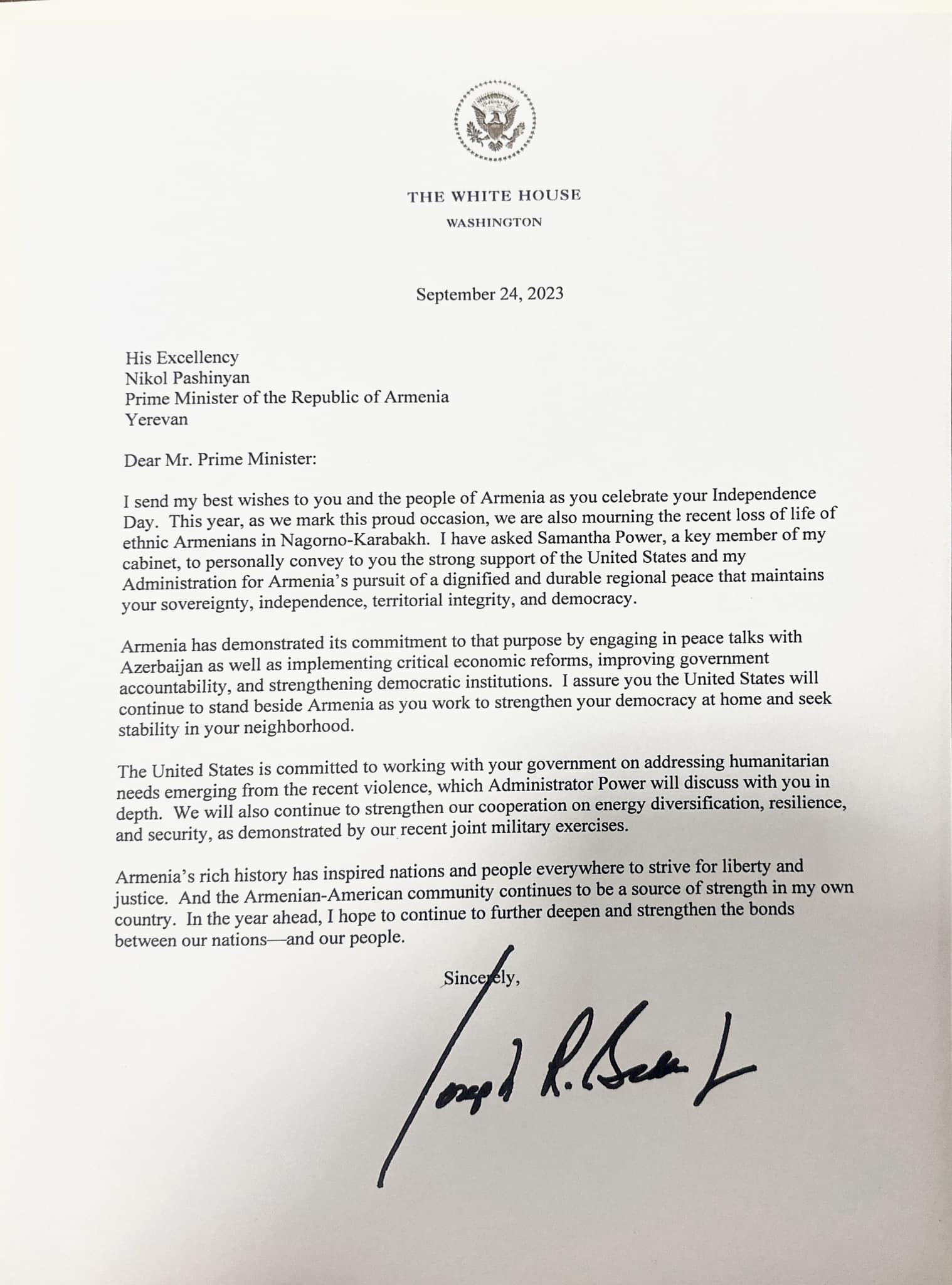
They then discussed the humanitarian situation in NK, the opportunities for providing support to Armenians of NK, the developments in the region, and the future development and expansion of Armenia-USA cooperation.


